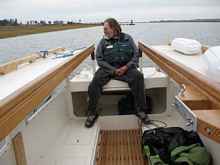| I was stricken with madness; I had
to have a boat. Not some glass production speed boat, nor a world
cruising sail boat, but a trailer/camper. Some place to be on
the water to reconnect with nature and spend time with my wife.
A boat that is easy to transport and store.
In February of 2008 I got the plans for Jim
Michalak’s Caroline. I had purchased Scram-Pram
but Caroline seem to fit her expected use better. Now I hadn’t
been a boat builder, so I read a lot. Then I started the spars
to ease into how to use epoxy. There was a lot of thinking and
little building.
In January 2009 MDO was ordered from our local lumber and hardware
and epoxy kits from Duckworks. I was on fire, this boat will be
in the water by summer…by the end of August…The first
week of October we launched. I guess I can envision a task done,
quicker than I can perform it. Then redoing the errors made each
step longer, and there were plenty of errors (or call them unintended
adjustments). As the boat neared completion one neighbor said
‘you must be a craftsman’ ,’no I make at least
one mistake a day’, was the reply. Oh the wonders of filled
epoxy. Now I tried to be careful and precise, but not knowing
what you’re doing isn’t an asset.
As the photos show the boat developed day by day:
 |
The hull takes form. |
| Epoxy Graphite and glass on the bottom. You
can make out the lead poured in the lee board near the bow. |
 |
 |
She turned very easily. |
| Turning rig is on. |
 |
 |
Looking forward is the box that will hold the
head, windows are cut out. |
| On the water without the rig. |
 |
 |
El Bufo eyeing a fly. |
Our Caroline ‘Lily-pad’ is mostly to Jim Michalak’s
specs. I considered changing the rig a bit, but I did not do it,
other than to increase the mizzen and add slab reefing to it.
Hull dimensions are to the plan.
The ‘customizations’ are minor details, I’ll
list them for you.
1. I extended the cabin front sloping forward 2 feet. This was
to accommodate the porta-potti so it can be used in place. Also
to hopefully foil the brunt of a green water wave over the bow
if we venture out toward the Golden Gate. This also entailed lowering
the thalwart beam to allow clearance to the head. A weaker configuration
than the specifications. I did compensate in other forward structures.
I boxed around the head and the cover serves as a step up onto
the fore deck. There are wash boards fore and aft.
2. The anchor well has a hatch added. I did not want to be scooping
up a hundred pounds of SF Bay slop, in heavy chop.
3. The motor well was eliminated to provide more interior space,
and buoyancy.
4. The outboard motor is hung on a bracket on the transom. This
decision, like all in boating, was a trade off. Not the best place
for the motors sake.
5. The side cutouts for the windows were arched both for looks
and to add to the fore-aft structure in case of that afore mentioned
green water.
6. I’ve added about 25 lbs of lead to the bottom of the
lee board, and have two 32 amp hr agm batteries for house power
maybe 70lbs, so boat and rig is maybe 900 lbs.
| Ready for maiden voyage |
 |
 |
On the water at last. |
| Forth day out. |
 |
A few other things worth noting:
a. Off shore style hatches were built into the benches. These
latch in place so the contents of the compartments stay put in
the event of a knockdown.
b. Hand rails are added to the coach top. One reason is to contain
items on the coach top, while camping, and secondly to prove lot
of area to tie stuff on (camp tent , fenders, boat hook, propane
storage cylinders).
c. Gratings were made for the cabin sole. These lift up to cleats
on the bench edges to make a ‘queen’ sized bed. An
unexpected advantage is the cabin stays cleaner all the crud tracked
aboard falls through the gratings.
d. A kitchen pull-out bread board style table slides under the
aft deck. (Chart table, card table, dinning table.)
e. This week I added a folding hard top. I don’t like
the idea much, but La Rena is uncomfortable leaving the boat unsecured
at public docks, while we go exploring old Delta towns (it can
always be removed).
So this is Lily Pad as she sits. She is my first boat and I
am well pleased with Jim’s design. We are looking forward
to years of camping on her.
 |
Grinning |
Well that’s it, for now from El Bufo Viejo, on the Lily
Pad, adios

|

